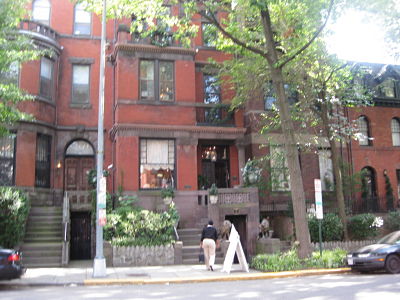|
Date: September 10, 2009 From: Washington City Paper Everything for Sale at The Mansion on O Street |
|

|
|
| “Everything in the mansion is for sale,”
states the woman seated near the front door of a place which calls
itself, grandly, the Mansion on O Street. “If you don’t see a price
tag, just bring it to me. If it’s too big, just take a picture on your
cell phone and bring it here.”
“Just have fun,” she directs me—“it’s so much fun.” The woman is H.H. Leonards, proprietor and creator of said mansion—several brick row houses combined into one colossal space just off Dupont Circle. Leonards opened the place in 1980, starting with 2020 O Street, later devouring half the block by purchasing 2022, then 2018, then 2024. The Mansion bills itself as a hotel, museum, event venue, and, sometimes, a store: For the past 20 years, the Mansion has opened its doors for an annual multiday sale that offers delights even for—or especially for—those who hate shopping. Wandering the Mansion’s labyrinth of rooms and stairways, one sees innumerable oddities: a wooden jacuzzi; a basement wine room/library filled with bottles of “Mansion on O Street” chardonnay, cabernet sauvignon, and merlot; a pool table covered with baskets stuffed with fake red flowers. There’s also a log cabin-themed loft decorated with bulls’ horns and rustic-looking knives. Guitars decorate bedrooms and lounge space, hiding like children behind chairs here or near the foot of a bed there. Emmylou Harris scribbled her signature on one, as did Bob Dylan. (Somehow, it’s not a stretch to picture Dylan soaking in that jacuzzi or plotting a chess game at the glass table in the same bathroom—which is adorned with a whimsical chess set with pieces stationed dutifully for play.) Leonards says the guitars are the only items not for sale. “They were gifts of artists who stay here,” she explains. Leonards, who describes herself as painfully shy, has large eyes and pale skin and prefers not to introduce herself by name to buyers—or conduct in-person or phone interviews with reporters. She requested all questions from Housing Complex be sent via e-mail, to which she replied at length. “I prefer being anonymous, and just listen to other people talk about their stories,” she writes. It sounds extreme: selling everything. But spend three minutes winding through the Mansion’s rooms, and you realize most items—a carved wooden bear lamp, a table with an embedded Monopoly board, thousands of framed collages, photographs, and paintings—won’t sell. And Leonards, who obviously has other sources of income from hosting events and putting up hotel guests, seems fine with that. “We have not earned enough to pay 10% of our electric bill,” she writes of this year’s sale, which ran from Aug. 30 through last Friday. Most transactions contribute $10–$20 to the Mansion’s coffers, probably small items such as necklaces, hats, dishes, pill boxes, and books with titles like In Search of Excess and With or Without Roses. It’s not that Leonards doesn’t want to sell the larger items: “I would love to sell something big sometime. Wow. Especially now with the economy.” But ultimately, she writes, the sale is “not about making money. It is about the community, and everyone sharing. And it is fun. The same people come back every year, and new neighbors come in.” Image by Darrow Montgomery |
|
